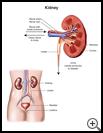
Nephrotic Syndrome
________________________________________________________________________
KEY POINTS
- Nephrotic syndrome is when the filters in the kidneys are damaged and let too much of the body’s protein (albumin) pass into the urine.
- The treatment of nephrotic syndrome depends on the cause. Sometimes it will get better on its own. Sometimes it gets worse and leads to kidney failure. In serious cases, you may need dialysis.
- Follow the full course of treatment prescribed by your healthcare provider. Take all medicines exactly as directed by your provider. Ask your healthcare provider how to take care of yourself at home.
________________________________________________________________________
What is nephrotic syndrome?
Nephrotic syndrome is when the filters in the kidneys are damaged and let too much of the body’s protein (albumin) pass into the urine.
The kidneys are inside the belly, on either side of your spine just above the waist. They make urine by removing waste products, extra salt and other minerals, and water from the blood. Glomeruli are the tiny filters in the kidneys that help remove waste products from the blood.
What is the cause?
Nephrotic syndrome can be caused by anything that harms the filters in the kidney such as:
- Infection in the kidneys or blood
- Autoimmune disease, which is a disease that causes your body to mistakenly attack your own tissue such as lupus
- Certain medicines such as nonprescription pain medicines and some antibiotics
- Heart disease and high blood pressure
- Injury to the kidneys from an outside force such as a car accident, fall, or gunshot wound
- Kidney failure from long term disease such as untreated high blood pressure or from injury to the kidney
- Anemia, which is a problem with your red blood cells
What are the signs and symptoms?
You may not have symptoms. If you have signs and symptoms, they may include:
- Too much protein in your urine
- Not enough protein in your blood
- Too much cholesterol and fat in your blood
- Frothy or foamy urine
- Bloody urine
- Swelling in your legs and feet or any place on your body
- Weight gain
- High blood pressure
- Diarrhea
- Decreased appetite
How is it diagnosed?
Your healthcare provider will ask about your symptoms and medical history and examine you. Tests may include:
- Blood tests
- Urine tests
- Ultrasound scan, which uses sound waves to show pictures of the kidneys
- CT scan, which uses X-rays and a computer to show detailed pictures of the kidneys
- Kidney biopsy, which is the removal of a small piece of tissue from the kidney for tests
How is it treated?
The treatment of nephrotic syndrome depends on the cause. Your healthcare provider may prescribe medicines to treat your blood pressure and remove extra fluid from your body.
Sometimes it will get better on its own. Sometimes it gets worse and leads to kidney failure. In serious cases, you may need dialysis.
Dialysis uses a machine to do the work of your kidneys. It removes waste products and extra water from your blood and can be life saving. Dialysis usually needs to be done several times a week.
You may need a kidney transplant.
How can I take care of myself?
Follow the full course of treatment prescribed by your healthcare provider. Take all medicines exactly as directed by your provider.
- If you have diabetes, control your blood glucose. Keeping your blood glucose level in the proper range may delay blood vessel damage and damage to other organs. Follow your healthcare provider's instructions for testing your blood and ask your provider what you should do if it is too high or too low.
- Control your blood pressure. Ask your healthcare provider what a healthy blood pressure should be for you. Check your blood pressure or have it checked as often as your provider advises.
- Eat a healthy diet. Ask your provider and dietician:
- If there are any foods you need to avoid
- What is the right amount of sodium for you each day
- How much liquid you should have each day
- Lose weight if you are overweight, and stay at a healthy weight. Weight loss can make it easier to control your blood glucose, blood pressure, and cholesterol.
- Exercise regularly according to your healthcare provider's instructions. Regular exercise can help you control your blood glucose and blood pressure, and help you keep a healthy weight.
- Ask your provider what medicines you need to avoid because they could hurt your kidneys. For example, using ibuprofen, naproxen, acetaminophen, or high doses of aspirin for a long time may damage your kidneys. Some antibiotics may damage your kidneys.
Ask your provider:
- How and when you will get your test results
- How long it will take to recover
- If there are activities you should avoid and when you can return to your normal activities
- How to take care of yourself at home
- What symptoms or problems you should watch for and what to do if you have them
Make sure you know when you should come back for a checkup. Keep all appointments for provider visits or tests.
You can get more information from:
- The National Kidney Foundation
800-622-9010
https://www.kidney.org/

